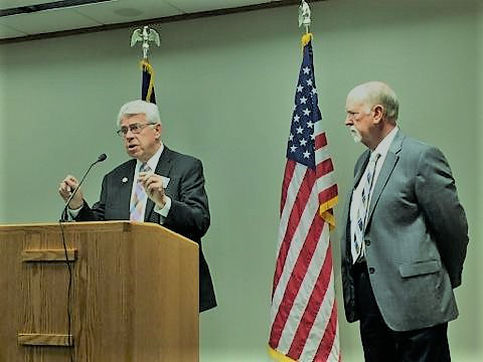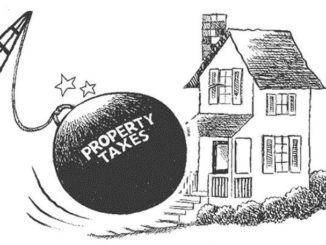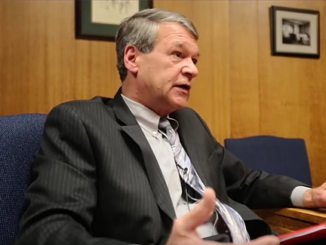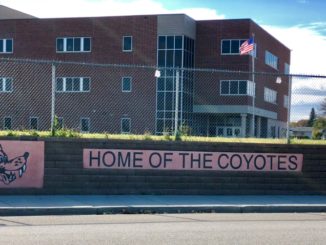
Back in April of this year, I wrote about the fact that the finger pointing in regards to property taxes had begun again. As part of that article I wrote this:
“While [the initiated measure to abolish property taxes] was headed to a vote in June of 2012, an interesting thing was taking place. On one hand, we had the local governments pointing fingers at the state. On the other hand, we had the state pointing fingers at the local governments. And in the middle, we had the taxpayers. Many of whom didn’t realize that both were to blame.”
As some property owners around the state get notifications of double digit percentage increases to their property tax bills, the finger pointing continues. And today Majority Leaders Rich Wardner (State Senate) and Al Carlson (State House) engaged in some of it themselves with an article on SayAnything Blog.
While much of what Senator Wardner and Rep. Carlson have to say in their article is true, they perpetuate something that is at best inaccurate and at worst an outright lie. Here it is:
“Property taxes are a hot topic right now, especially in communities where property tax increases are being considered. Without exception, no one likes taxes, especially property taxes. That said, property taxes are necessary to fund local schools, law enforcement, emergency services and infrastructure. It is important to remember that responsibility for determining the appropriate use and rate of property tax rests solely with local voters and elected officials.
“As part of that debate, the question has been asked as to what role, if any, the state should play in the assessment, collection and spending of local property taxes? That is a great question. Property taxes are levied and spent by local governments. The state has little, if any, control or oversight of local property taxes, valuations or spending.” (Emphasis Added)
The statement that the “rate of property tax rests solely with local voters and elected officials” and that the “state has little, if any, control or oversight of local property taxes” is simply not true. Charlene Nelson of Casselton, ND explained it best in a book she co-authored during the push to abolish property taxes in 2012 titled “Property Tax Revolution”:
“Those promoting and attempting to justify property taxes argue property taxes provide ‘local control.’ The question is: local control of what? Property taxes do not provide local control of anything. In North Dakota:
– The state legislature mandates how many mills local political subdivisions can assess, and their use.
– The State Board of Equalization controls how properties are assessed.
– The state mandates how money is spent on items such as roads and schools.
– Cities and counties that balk at the state mandates may find other funding options cut off.
-The equalization board routinely orders cities and counties to increase valuations even when their budgets do not call for additional revenues.”
The State Board of Equalization consists of the “governor, state treasurer, state auditor, agriculture commissioner, and state tax commissioner”. Nelson’s mentioning of this board is a great example of what she refers to as “The Myth of Local Control”. And it is a perfect illustration that Wardner and Carlson’s statements are not accurate.
If you’re interested, you can read the “duties and powers” of the equalization board in the North Dakota Century Code here . Here’s an enlightening example of one of them:
“If it believes an assessment to be too low, the board may increase the assessment on any separate piece or parcel of real estate. The secretary of the board, by mail sent to the last-known address of the owner to whom the property was assessed, shall notify such person of the amount of increase made by the board in such assessment.” (Emphasis Added)
To further illustrate the fact that the state does indeed play a role in “control or oversight of local property taxes”, we need only to look at the process by which property owners appeal proposed increases to the assessments on their properties. Take a look at this diagram and explanation from the “Taxpayer Bill of Rights”:

Not only is the State Board of Equalization the “final step” in the appeals process, but “The decision of the State Board is final.” That seems like a lot of control and oversight to me. And yes, this is basically the equivalent of approaching the Almighty Crown and pleading for their benevolent mercy towards the lowly peasant. So please, don’t insult us by pretending the state has nothing to do with property taxes. It’s just not true.
When are the people of North Dakota going to learn that there is no “fixing” property taxes? That should be blatantly evident to anyone with an honest bone in their body. To close my article in April, I said this:
“Are we ready to finally accept the fact that we cannot reform something that is inherently broken, immoral, and abusive? If the answer to that is ‘No’, then perhaps we should wait until those tax statements come out that don’t reflect any buy-downs. Then perhaps the appetite will finally be there to rid ourselves of the abuse.
“Until then, prepare yourselves. The finger pointing has begun… again. Fool us once, shame on you. Fool us twice, shame on us.”
Thankfully an increasing number of North Dakotans are realizing these facts. And they are not only wondering if another effort to abolish property taxes is on the horizon, but they’re hoping that it is. Here is just one example of some folks that feel like this. This comes from the comment section of the SayAnything Blog article:

Property taxes need to be eliminated. It is indeed the only logical “fix” to the government-imposed curse. But if it is to become a reality in North Dakota, we must do better than last time. And that will require committed activists who are willing to dedicate time, energy, and resources to the cause. Why? Because we need Property Tax Revolutionaries, not the summer soldier and the sunshine patriot who volunteer only to hold the coats of those who are actually willing to fight.
Sources:
1. https://www.sayanythingblog.com/entry/majority-leaders-al-carlson-rich-wardner-property-tax-hikes-probably-result-local-not-state-budgeting/ 2. “Property Tax Revolution: It’s Our Home, Not Theirs!”, By Robert Hale, Brett Narloch, & Charlene Nelson, Chapter 2, pgs. 19-20.
3. https://www.nd.gov/tax/user/local-government/state-board-of-equalization/
4. http://www.legis.nd.gov/cencode/t57c13.pdf#nameddest=57-13-04
5. https://www.nd.gov/tax/data/upfiles/media/taxpayer-bill-of-rights.pdf?20170922214705
6. https://theminutemanblog.com/single-post/2017/04/17/Property-Taxes-Let-the-Finger-Pointing-Begin-Again





